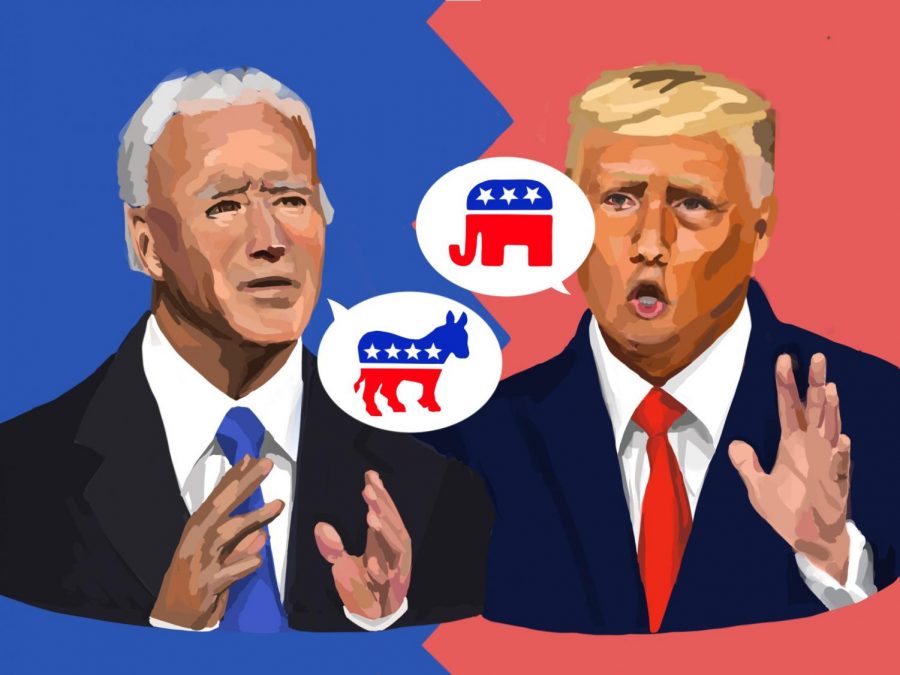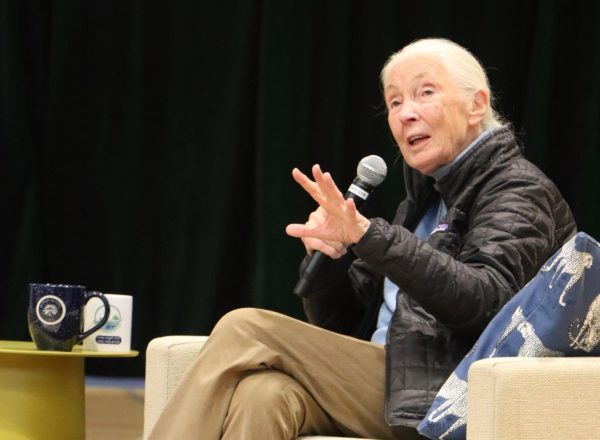Various Key Issues, Voting in Question During 2020 Elections
The results of the 2020 election could substantially impact several contentious matters in the United States, according to Menlo community members. In addition to these consequential matters, controversies over voting have also arisen so far during the period leading up to this year’s election. Staff illustration: Grace Tang.
October 26, 2020
Note: This story is the second of a two-part series about the 2020 elections; read the first one here. The series is an extension of a story that appeared in The Coat of Arms October 2020 47.1 print edition.
———
For students and staff members, various issues are at stake during the election. Abortion rights, the economy, the coronavirus pandemic, healthcare and climate change are among the most prominent matters that could hinge on the results of the upcoming presidential and Congressional elections. With vastly contrasting candidates, the election could determine significant variations in policies around each of these issues.
What’s at Stake This Year?
Abortion is among the most notable and contentious issues susceptible to change based on election results this year. In the wake of Ruth Bader Ginsburg’s death, Trump has nominated Judge Amy Coney Barrett to occupy the new Supreme Court vacancy.
If Barrett is appointed, justices who tend to rule conservatively would outnumber those who generally align with liberal views, six to three. “With a 6-3 [Supreme Court], and if the House or Senate go Republican, then it would be really easy for them to pass anti-abortion laws, which I think is really messed up,” Rajkovic said.
As Republicans rush to confirm Barrett, it seems increasingly likely to Nelson that they will succeed. “The Republicans are already going to get their third Trump Supreme Court justice,” he said. “So the stakes are a lot lower [in the election] for Republicans right now; they have a lot of power to begin with.”
Chavinson sees this turmoil around the Supreme Court as potentially beneficial to Biden’s campaign. “It’s a way for Biden to gain more traction and gain more money from the Democratic Party and from sympathizers, and especially mobilize more young women to stand behind him,” she said.
On the other hand, Lenden believes that Barrett’s nomination to the Court will galvanize more Republican voters. “Throughout history, conservatives have rallied — really rallied — when there was a Supreme Court [vacancy] up,” she said. “The Supreme Court [decides on] social issues that are really important to a lot of conservatives, like the legalization of gay marriage and abortion rights.”
Barrett’s potential confirmation could also impact healthcare. “With the Affordable Care Act hanging in the balance, will people be galvanized to go and vote for Biden because they don’t want to lose their healthcare? I’m wondering about that,” Nelson said. The Affordable Care Act, which was passed in 2010 during Barack Obama’s presidency, expanded access to healthcare for many Americans.
The pandemic and the economy have also been primary topics during the election. “The Trump administration’s COVID-19 response […] is going to be [its] Achilles heel,” Devitt predicted.
“A lot of people are leaning toward more socialist government ideals now because a lot of people have been hit really hard economically [through the pandemic],” Rajkovic said. He is slightly worried about this shift in Americans’ inclinations. “Socialism de-incentivizes innovation,” he said.
Nelson is concerned about the pandemic in a different sense: it has shown the tremendous effect of politicization in American culture. “Here we have something that should have united us together, should have advanced us a little bit beyond the hyper partisanship and the tribalism,” he said. “But it only intensified it.”
To Listgarten, climate change is one of the most critical aspects of the upcoming election. “I’m hoping if [Biden] gets elected, there will be a lot of change in terms of new jobs and creating a carbon-neutral future for America,” he said.
Chavinson shares this outlook. “Especially looking at climate change — that was the main cause of the [recent California] fires — I think it’s really only going to get worse if Trump’s in office,” she said.
The Black Lives Matter movement, which gained remarkable attention through protests this summer, is another topic of interest during the election. Lenden believes that Americans are likely to factor the candidates’ positions on police brutality and racial justice into their voting decisions. The Black Lives Matter movement, she said, will ultimately help Biden galvanize a greater number of Democratic voters.
“Right now, we’re in the midst of so much craziness and progressiveness with the Black Lives Matter movement, with climate change, with the pandemic [and] with the economy being the worst it’s been in decades,” Chavinson said. “These are all really big points that I think are going to really determine what the outcome of what America is going to be, looking forward.”
Chavinson added that the candidates’ treatment of and rhetoric around each of these key issues will largely determine their chances during the election. “I think it’s incredibly nuanced because it’s all about how the candidates are going to play it off,” she said.
“Accepting and acknowledging how problematic [current events are] will be a huge thing for the candidates to do and will really help them gain support,” McGrath said.
But Schafer believes that most Americans already have their minds set about who they plan to vote for, based on the candidates’ prior policies on major national issues. “People just have an opinion about these things,” he said. “Now it’s just a question of who is going to show up and vote.”
Voting in 2020
As the pandemic poses safety concerns around in-person voting, more voters are turning to mail-in ballots while states implement various rules around voting by mail. The prevalence of mail-in voting this year has caused widespread confusion and controversy. In several states, including battleground states such as Pennsylvania and Wisconsin, ballot counting will not begin until Election Day on Nov. 3.
“I think it’s very likely that we will not know the winner on the night of the third of November, which isn’t the end of the world,” Schafer said. “But the longer it goes on, and the more people raise questions, the more damaging it could be for the sense that elections are fair.”
Nelson shares this worry. “The scenarios kind of boggle my mind because we are America,” he said. “We have always prided ourselves on a peaceful transition of power.”
“I don’t think it’s going to be a peaceful transition of power either way,” Listgarten said.
Devitt believes that the only way for the election to be decisive is if Trump loses in both Florida and Wisconsin. “[The election could be conclusive if] it’s pretty clear that Biden has a blue wave that’s sweeping the nation. That could happen, but I doubt it.”
He pointed out that both Trump and Biden have already assembled impressive legal teams in anticipation of mail-in voting contention during and after Election Day. “It’s probably going to be a dragged-down legal fight,” he said.
The 2020 presidential election also reminds Devitt of the presidential election in 2000, when the outcome hinged on just 537 votes in Florida. Days later, after declarations of victory from both sides, the Supreme Court ultimately had to decide the election winner in Bush v. Gore.
“I have a real fear that this is going to be something that’s contested similar to 2000, but in a different world that is incredibly polarized [with] more and more violence and with more and more intolerance,” Devitt said.
“It could be Florida times ten [this year],” Schafer said.
Listgarten hopes that, amid national chaos, a silver lining might emerge: an increase in voter turnout. With recent data from the first wave of mail-in voting, it is apparent that voters are much more eager to participate in this year’s election compared to in 2016.
Note: In the approximately two weeks since Devitt and Schafer were interviewed by The Coat of Arms, the presidential debate and other recent political events have caused slight modifications to their perspectives. Devitt and Schafer both believe that the election’s prospects now seem more decisive. “Since we spoke, I think the odds that the election will be a cliffhanger have diminished. Biden seems to have consolidated his lead and has more paths to victory than Trump,” Schafer said in an email to The Coat of Arms.














